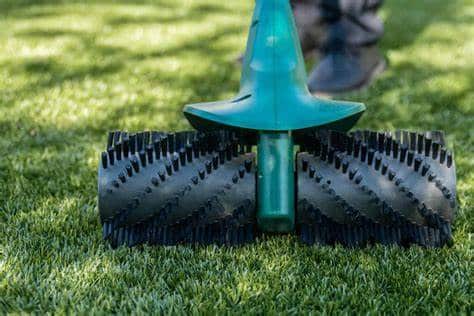How To Clean Pet Waste From Artificial Grass In Lemon Grove?

- Make it a habit to remove solid pet waste from your artificial grass as soon as possible. Use a pooper scooper or a plastic bag to pick up the waste. Ensure that you wear gloves while doing this to maintain hygiene. Prompt removal not only prevents the waste from seeping into the grass but also reduces the risk of bacteria growth and odors.
- After removing solid waste, rinse the affected area thoroughly with water. Use a garden hose or a watering can to wash away any remaining residue. This helps in diluting any urine traces and prevents the buildup of odor-causing bacteria. Additionally, it keeps your artificial grass looking fresh and clean.
- For tougher stains or lingering odors, using a pet-safe cleaner is advisable. Look for cleaners specifically designed for artificial grass and safe for pets. Avoid harsh chemicals that can damage the grass fibers or pose a health risk to your pets. Follow the manufacturer’s instructions carefully while using the cleaner to ensure effective and safe cleaning.
- Regular brushing of your artificial grass helps in loosening and removing any pet waste particles stuck in the grass blades. Use a stiff-bristled brush or a synthetic grass rake for this purpose. Brushing also helps in maintaining the grass’s natural appearance by preventing matting and flattening caused by pet activity. Aim to brush your artificial grass at least once a week, or more frequently if you have multiple pets or heavy pet traffic.
- Ensuring proper drainage is crucial for preventing the buildup of pet waste and reducing the risk of unpleasant odors. If your artificial grass installation lacks a proper drainage system, consider adding one. A perforated base or installing a layer of gravel underneath the grass can improve drainage and facilitate the removal of urine and water. Proper drainage not only keeps your artificial grass clean but also promotes a healthier environment for your pets.
FAQs
Can I Use Bleach To Clean Pet Waste From Artificial Grass?
It’s not recommended to use bleach or other harsh chemicals on artificial grass as they can damage the grass fibers and pose a health risk to pets. Instead, opt for pet-safe cleaners specifically designed for artificial grass.
How Do I Prevent My Artificial Grass From Smelling Like Pet Urine?
Regular removal of solid waste, rinsing with water, and using a pet-safe cleaner can help prevent urine odor buildup. Additionally, ensuring proper drainage and regular brushing of the grass can further mitigate odors.
Can I Use A Pressure Washer To Clean Artificial Grass?
While pressure washers can be effective for cleaning artificial grass, it’s essential to use them with caution. Use a low-pressure setting to avoid damaging the grass fibers or causing displacement of the infill. Always follow the manufacturer’s guidelines and recommendations for pressure washer use.
Conclusion
Maintaining a clean artificial grass surface in your pet-friendly yard is essential for both aesthetics and hygiene. By following these five tips, you can effectively clean pet waste from artificial grass, ensuring a clean and pleasant outdoor environment for you and your furry companions. Regular removal, rinsing with water, using pet-safe cleaners, brushing, and ensuring proper drainage are key practices to keep your artificial grass looking its best while minimizing odors and bacteria buildup. For more information, contact Artificial Grass Lemon Grove at (619) 754-9700.

